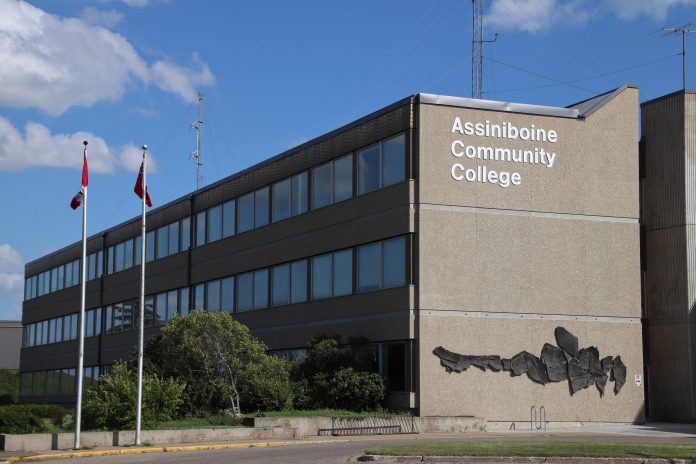At Assiniboine Community College, two tuition-free programs are providing Indigenous learners the skills they need to work in in-demand fields in Manitoba, and giving their respective industries qualified workers who are ready to hit the ground running.
The tuition-free Heavy Duty Technician program welcomed 12 Indigenous students in December 2021, funded through a partnership with Algonquin College of Applied Arts and Technology and Indigenous Youth Development Canada. Students in this program have completed hands-on, in-school training for 28 weeks plus a 280-hour paid work placement, with tuition, textbooks, personal protective equipment, supplies and tools all covered at no cost.
The tuition-free Agriculture Equipment Operator program provided an opportunity to 15 students starting this past February, funded through a partnership with the Congress of Aboriginal Peoples (CAP). The 13-week program began with a one-week preparatory course and finishes with an 80-hour paid work placement.
“Costs for training to acquire the skills and aptitudes required for entry into the job market are an ongoing barrier to employment,” said Assiniboine’s Director, Indigenous Education, Kris Desjarlais. “We are thrilled that students won’t have to worry about funding and can enjoy a hands-on learning environment. With this, learners are free to focus on their training.”
Both programs were chosen specifically to address gaps in their respective industries.
The agriculture industry is facing an aging workforce combined with the lack of skilled general farm workers and less people getting into the farm industry, said Brad Hack, Coordinator, Job Skills and Industry Certifications in Assiniboine’s Centre of Continuing Studies. It’s projected that 5,300 agriculture jobs in Manitoba—one in five—will go unfilled by 2029.
The students are learning the safe work practices and operational skills necessary to manage multiple enterprises found on farm operations across the country, Hack said.
“They’ll have a really good base for assisting employers with a farm operation,” Hack said. “After their two-week work placement where they get those real-life environmental skills on an operation, they’ll be job ready.”
It’s also an important step in reconciliation, he said.
“Indigenous people were here first, and know the land better, so let’s try and get more Indigenous people back into working the land and into farming,” Hack said.
“You look at what farming is like now with sustainable development processes and sustainable farming, and those are all Indigenous teachings and how they worked the land years and years ago. We’re kind of getting back to that so I think it’s important to bring Indigenous people back into the conversation.”
The Heavy Duty Technician program is also in demand, said Assiniboine’s Chair of Mechanical Trades, Lloyd Carey, who has seen similar successful partnerships between Manitoba Hydro and First Nations communities.
“When we were first looking into programs that would be beneficial (to be offered tuition-free) it was the first one that came to mind,” Carey said. “I knew the number of students that we’ve already put through and if we could help some more people get into it, it would be a really good thing.”
Students who complete the program gain credit for their Level 1 common core apprenticeship accreditation, allowing them to branch out even further into Heavy Duty Equipment, Agricultural Equipment or Truck and Transport specializations.
Heavy Duty Technician student, Josh Papequash , plans to use his experience and accreditation from this program to propel him to an eventual Red Seal in Heavy Duty Equipment.
“I was looking in to going back to school for some time, but work was too much of a priority. I was tired of being stuck on the same level, living paycheck to paycheck. Then my partner mentioned the course to me, and with me wanting a career instead of a job I jumped at the opportunity,” he said.
The job opportunities that come with program completion are also far-reaching.
“The nice thing about Heavy Duty is that in remote communities, there’s going to be construction and there’s going to be projects, and where that stuff is happening there is going to be equipment, and equipment that is going to need to be fixed,” Carey said. “The employment opportunities aren’t just in Brandon or in Winnipeg, they’re spread out across the province. There’s lots of opportunities up north, too.”
Much like the students coming out of the Agriculture Equipment Operator program, Heavy Duty Technician graduates will be well-rounded, entry-level technicians in their field.
“I was talking to an instructor who is working with the class, and he said he’d put this class up against any apprenticeship class,” said Carey. “He’s usually an apprenticeship instructor, so he’s working with people who’ve had a couple years in the trade already, so for him to make a comment like that while working with students who are basically starting from scratch — I was pretty happy to hear that, that they’re doing that well. It takes a bit to impress some of our instructors who work with the high levels of apprenticeship students.”
As for the students, both Carey and Hack said they seemed to be really enjoying their respective programs with an unmatched work ethic.
“The thing I enjoy the most is probably the hands-on experience—everything from learning the fundamentals of electrical components, learning how to wire up the lighting system, to tearing apart and rebuilding an engine. This program has given me the chance to improve my skillset. With that, along with the hands-on knowledge of our instructors, I feel confident to step forward on this career path,” said Papequash.
“Giving someone an education is one thing, but giving someone an education that allows them to get their hands in the work and get those real-life experiences in a certain industry or field is really valuable,” said Hack.
“It’s the little things that make a difference, so if a student can get into this course, and get their life on a better track, that’s all we really ask for,” said Carey. “I don’t think there’s anyone at the college who isn’t there to try and help students get ahead.”
Currently there are no other tuition-free programs available, but the college is always actively looking for further funding to make additional tuition-free options available, Carey said.
“With the program being tuition free, it gives me the opportunity to focus on my classes without the troubles of looking for funding. It also gives me the drive to make sure I take advantage of such an amazing opportunity,” said Papequash.
(ACC News Release)










